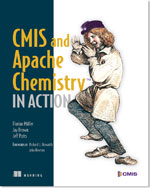 I’ve been working on another book project along with Jay Brown from IBM and Florian Mueller from SAP. It’s called “CMIS and Apache Chemistry in Action” and we intend for it to be the definitive guide to CMIS. I’m having a great time working with Jay and Florian who are two guys who have been heavily involved with the CMIS spec and Apache Chemistry from the beginning.
I’ve been working on another book project along with Jay Brown from IBM and Florian Mueller from SAP. It’s called “CMIS and Apache Chemistry in Action” and we intend for it to be the definitive guide to CMIS. I’m having a great time working with Jay and Florian who are two guys who have been heavily involved with the CMIS spec and Apache Chemistry from the beginning.
The book is being published by Manning and should be out in April of 2013. Today it has just been made available through the Manning Early Access Program (MEAP). We’re excited about having the book on MEAP because it means you can buy the book today and get the chapters as they are written. This gets drafts of the chapters in your hands quickly so you can apply what you learn to your projects immediately, but, even more importantly, gives you a chance to give us feedback that we can incorporate into the book.
I hope that everyone who wants to write content-centric applications on top of repositories like Alfresco, FileNet, SharePoint, Documentum, and so on, will benefit from the book, whether you are writing those apps in Java, Groovy, Python, PHP, JavaScript, C#, or Objective-C. The book starts out with an intro to CMIS and then moves through a real world example–a CMIS-based music mash-up application–built step-by-step. Once we’ve sufficiently covered the client-side stuff we move on to the server-side for those that need to know how to implement their own CMIS repositories.
The book covers the current 1.0 specification as well as the forthcoming 1.1 version of the specification.
We’ve still got a lot to write, but it feels great to reach the MEAP milestone. I look forward to hearing feedback from all of you as we continue to knock out chapters this Winter.
If you want to buy the book (MEAP or print, when it is available), you can use this code to get 37% off: 12cmisal.
